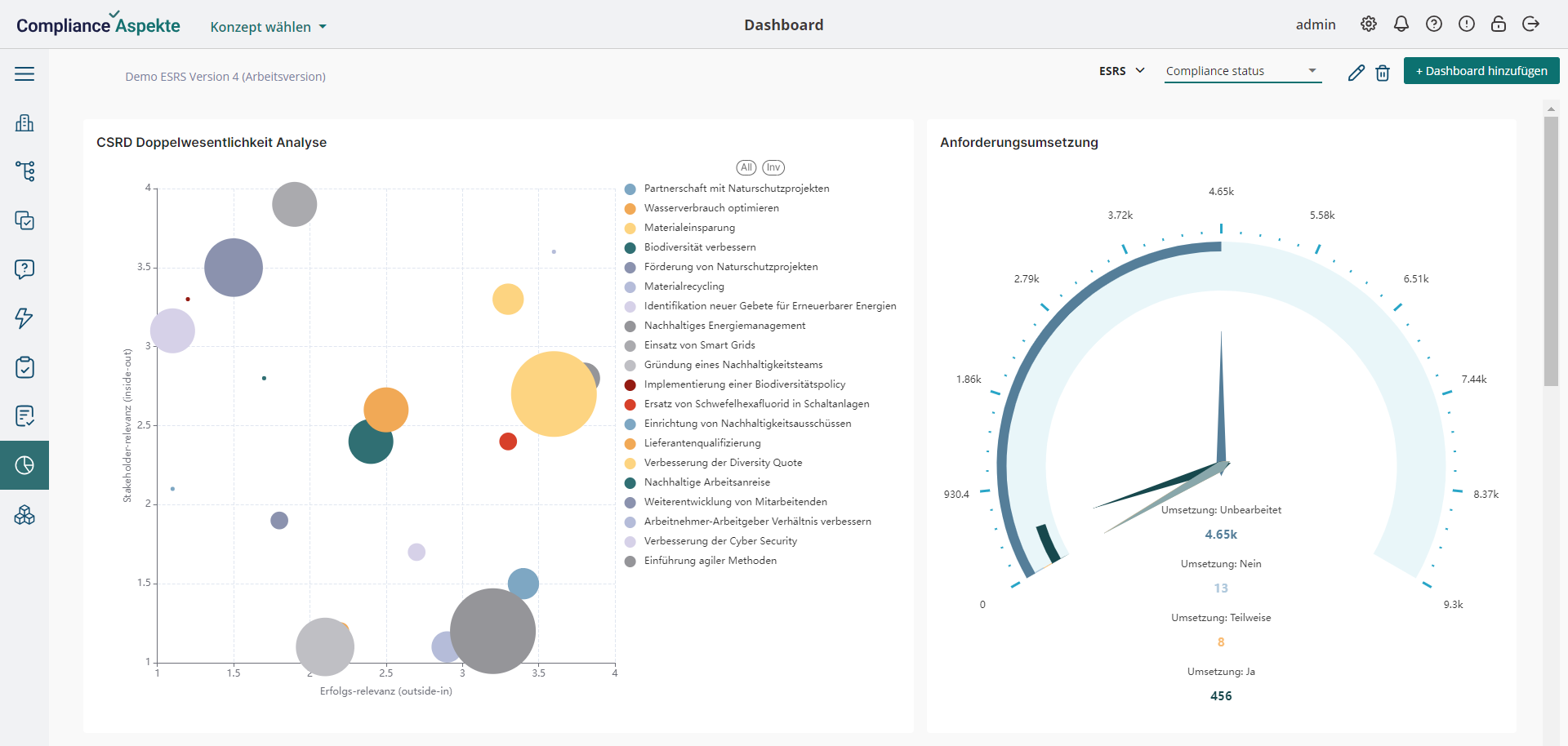Guiding through the entire ESG reporting process with our software and services
Using our sustainability reporting software, you can collect additional data on environmental, social, and governance (ESG) aspects. This data can be converted, analyzed, evaluated, and comprehensively reported. All sustainability data from your entire company, such as energy consumption, CO2 emissions, raw material usage, supply chains, social impacts, and governance practices, are centrally consolidated within Compliance Aspekte.
Our sustainability experts provide in-depth advice and support to assist clients with the implementation of reporting requirements as well as strategic corporate alignment.
This approach can include GAP analysis, CSRD implementation and target definition, consulting, training and GHG emission calculation support.
For companies interested in a turnkey package, we offer a fully managed CSRD implementation service that includes full reporting support.
From the introduction to the CSRD topic to setting up the Compliance Aspects Sustainability Platform. And then we are happy to take over the individual process steps and their preparation through to reporting and support with all tasks and problems that arise.
Logically navigating through each step to the final report
Talk to our expertsDouble materiality analysis integrating stakeholders, competitive analysis, and customer observation.
Collection of all relevant KPIs.
Gap analyses comparing status quo to standard requirements
Conducting risk analysis.
Evaluation and creation of an implementation roadmap.
Digitally controlled sustainability management.
Annual creation of a final report.
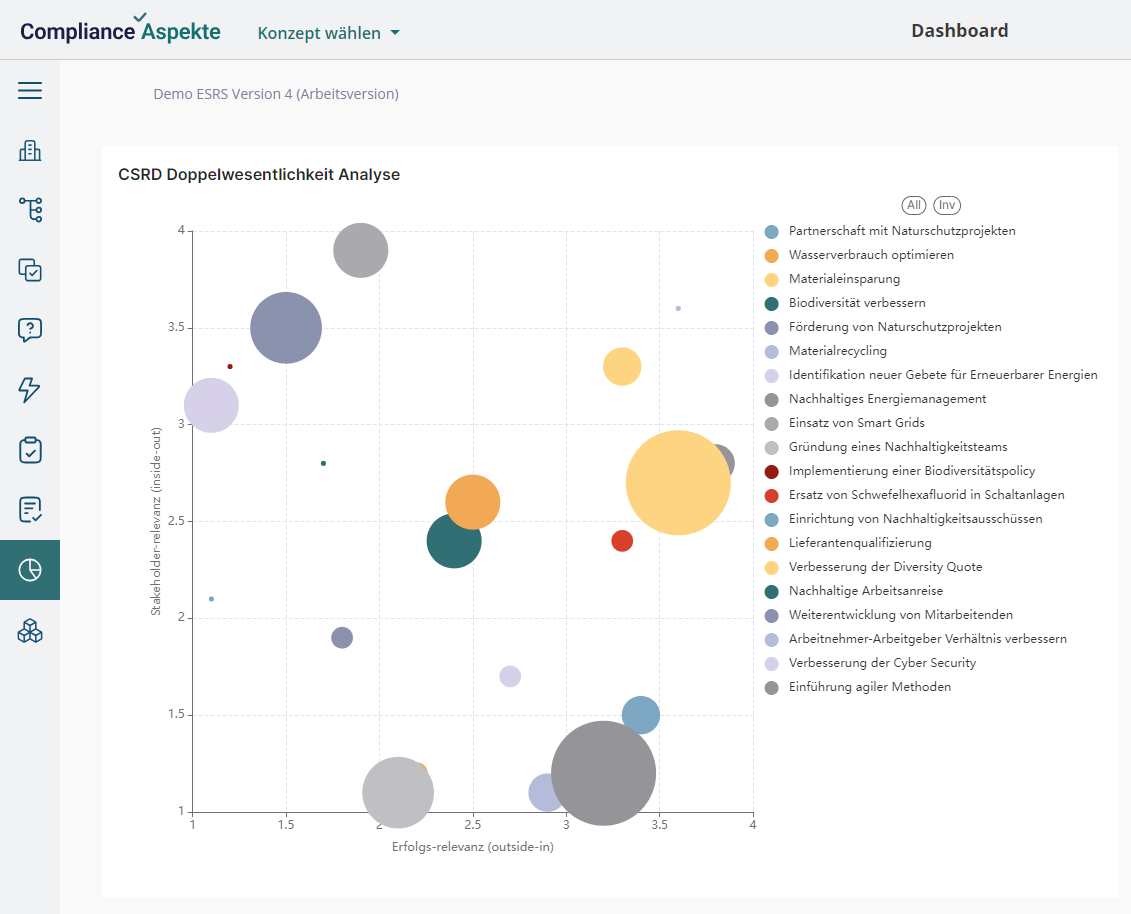
Double materiality analysis
Start by recording your material IROs (Important Risk and Opportunities) and actively involve your stakeholders. Evaluate financial risks and opportunities as well as the positive and negative effects by using both an inside-out and outside-in perspective.
Data collection
Based on the essential information determined, the system now supports the detailed recording of the company information.
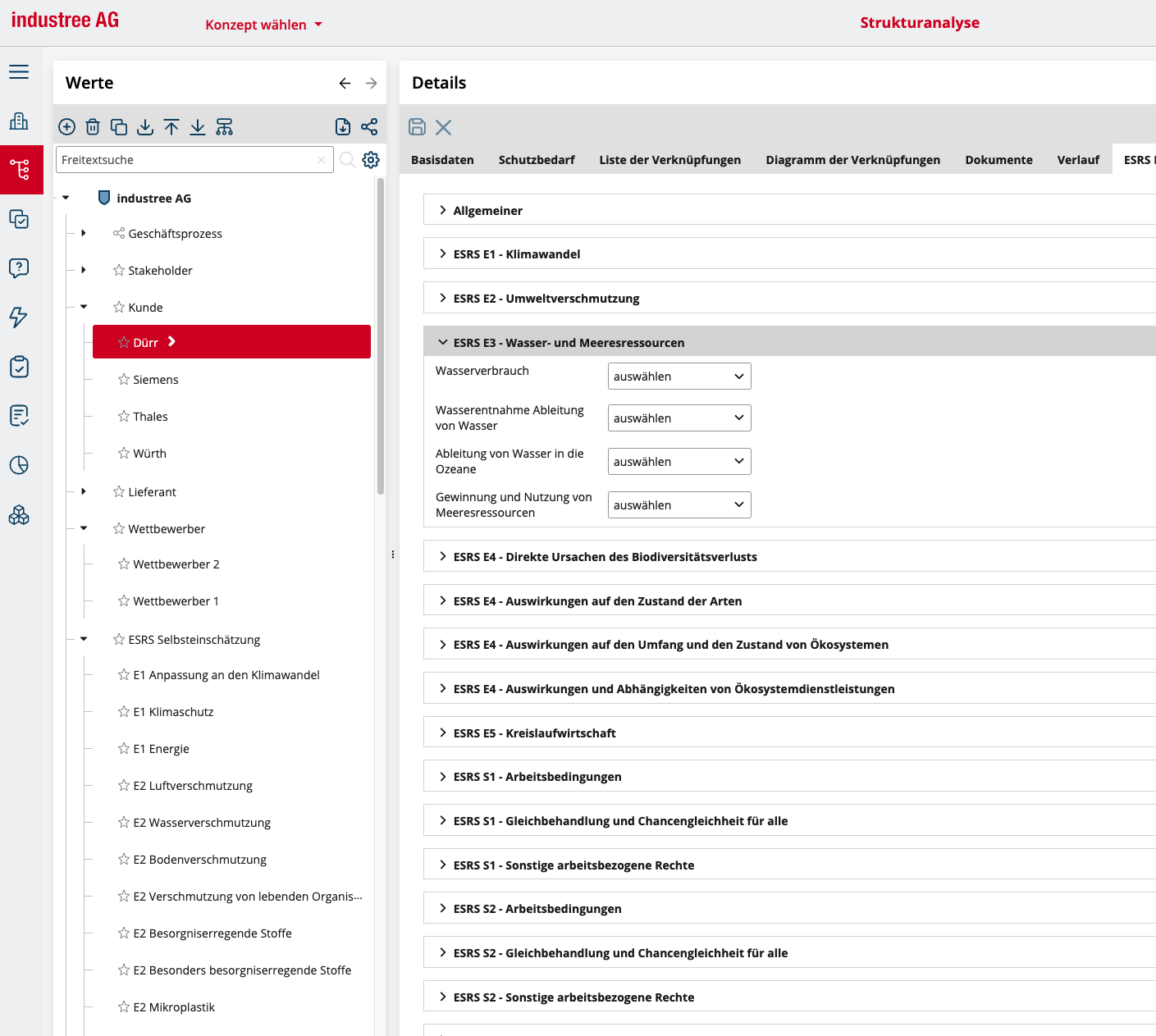
Audit security
Based on the sustainability information identified in the materiality analysis, the data relevant to the audit can now be stored in this process step. The total number of possible data points is automatically reduced in the system to the data evaluated for materiality, thus increasing clarity. Each piece of information recorded with the software can be continuously compared with the specific requirements of the CSRD.
Individualized monitoring
The software can be used to develop and track sustainability strategies. With the help of the freely configurable dashboard function, companies can monitor the analyzed vulnerabilities in a targeted manner. It is also possible to link guidelines, measures, and targets with IROs and disclosure requirements.
Multifunctional Sustainability
and Compliance Management Software
Sustainability reporting according to ESRS/CSRD
The software guides users through the entire reporting process, considering all relevant data points in the form of numerical, semi-narrative, and narrative information.
This data is processed by the system to be report-ready, and there is also the option to date and create custom reports.
Compliance and environmental reports
Certifications such as ISO 9001, ISO 14001, or ISO 50001 require extensive site-specific data. Compliance Aspekte Sustainability allows decentralized data collection, enrichment with additional information such as file attachments, secure storage, and automatic evaluation for many common certifications.
Previously collected data for other purposes, such as energy data for the corporate carbon footprint, does not need to be re-entered.
Corporate Carbon Footprint (CCF)
With Compliance Aspekte Sustainability, you can quickly and easily create a detailed CO₂ footprint of your company according to the Greenhouse Gas Protocol. It covers your entire value chain (Scope 1-3) as well as upstream and downstream processes.
You can evaluate the results by various categories such as country, location, region, or subsidiary and display them in a comprehensive report.
Custom KPIs and Evaluations
Whether it’s individual products or your entire product range, Compliance Aspekte Sustainability allows you to calculate, analyze, and evaluate the CO₂ emissions of your products.
Once implemented, you can provide your customers with immediate information about the CO₂ emissions of your products, even in the form of a customized PDF for individual orders.
AI from the Start
AI is already integrated and supports users in formulating their processes and tasks. Additionally, Helga—the chatbot—can provide definitive answers to specific questions about compliance and sustainability. The management system also generates automatic emails to the respective process owners, informing them about their tasks.
In the future, AI and the collected and determined information will also enable fully automated report creation.
Climate Protection Measures
Compliance Aspekte Sustainability specifically supports you in implementing your CO2 reduction strategy, such as according to the Net-Zero Standard.
You can document reduction measures for each of your locations, simulate the potential reduction, and compare it with your set reduction targets.
Compliance Aspekte features
that simplify ESRS
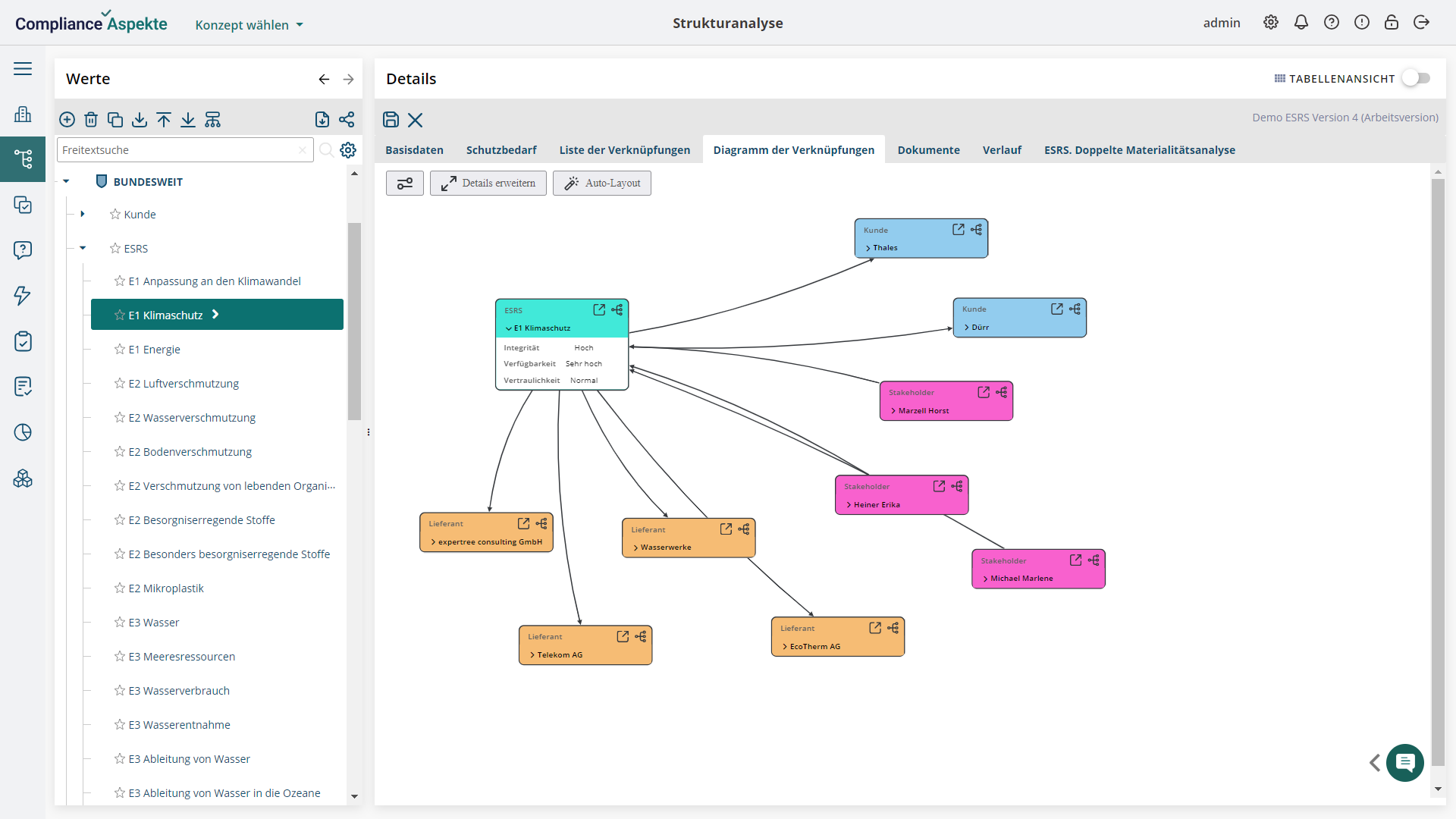
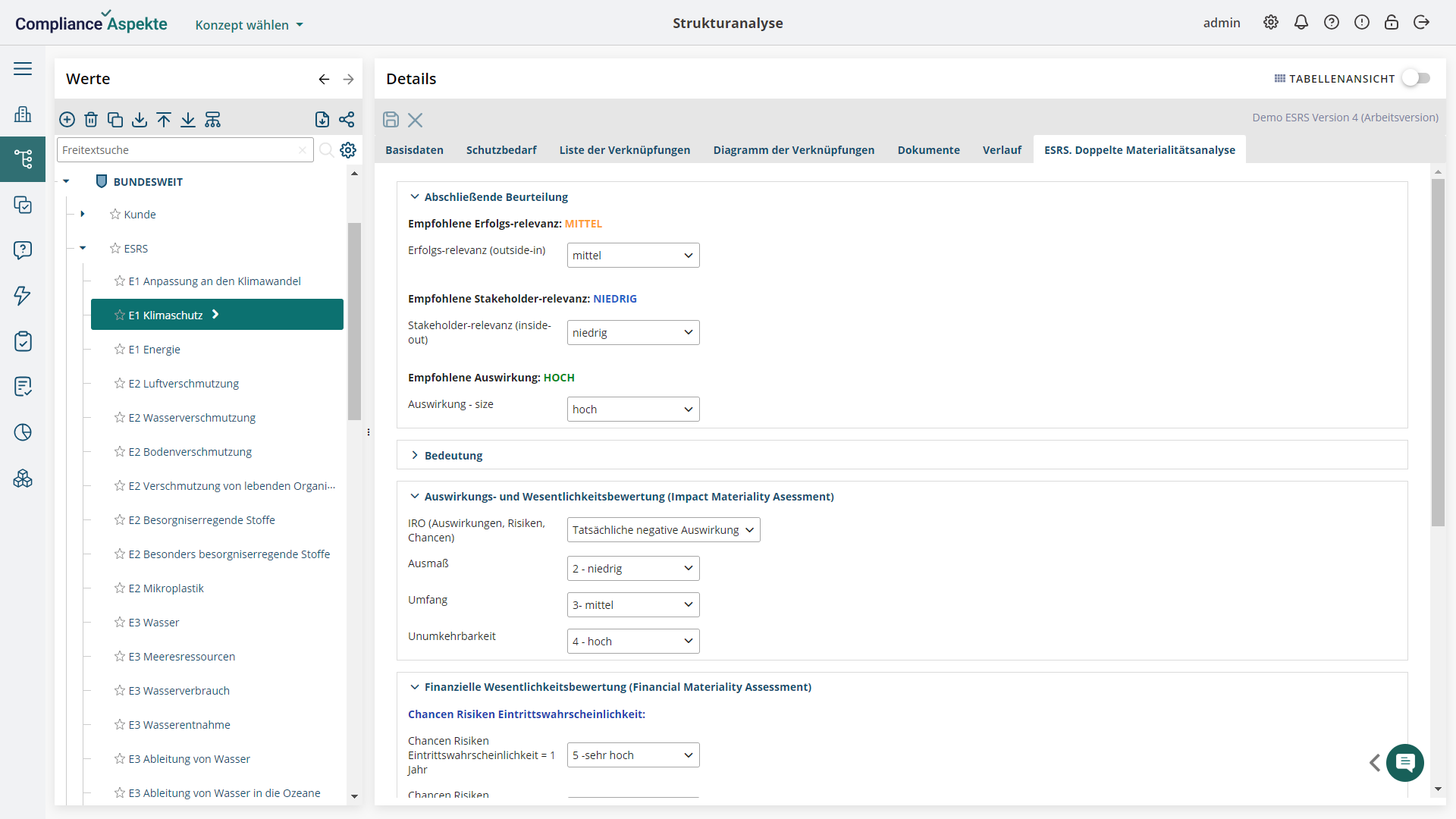
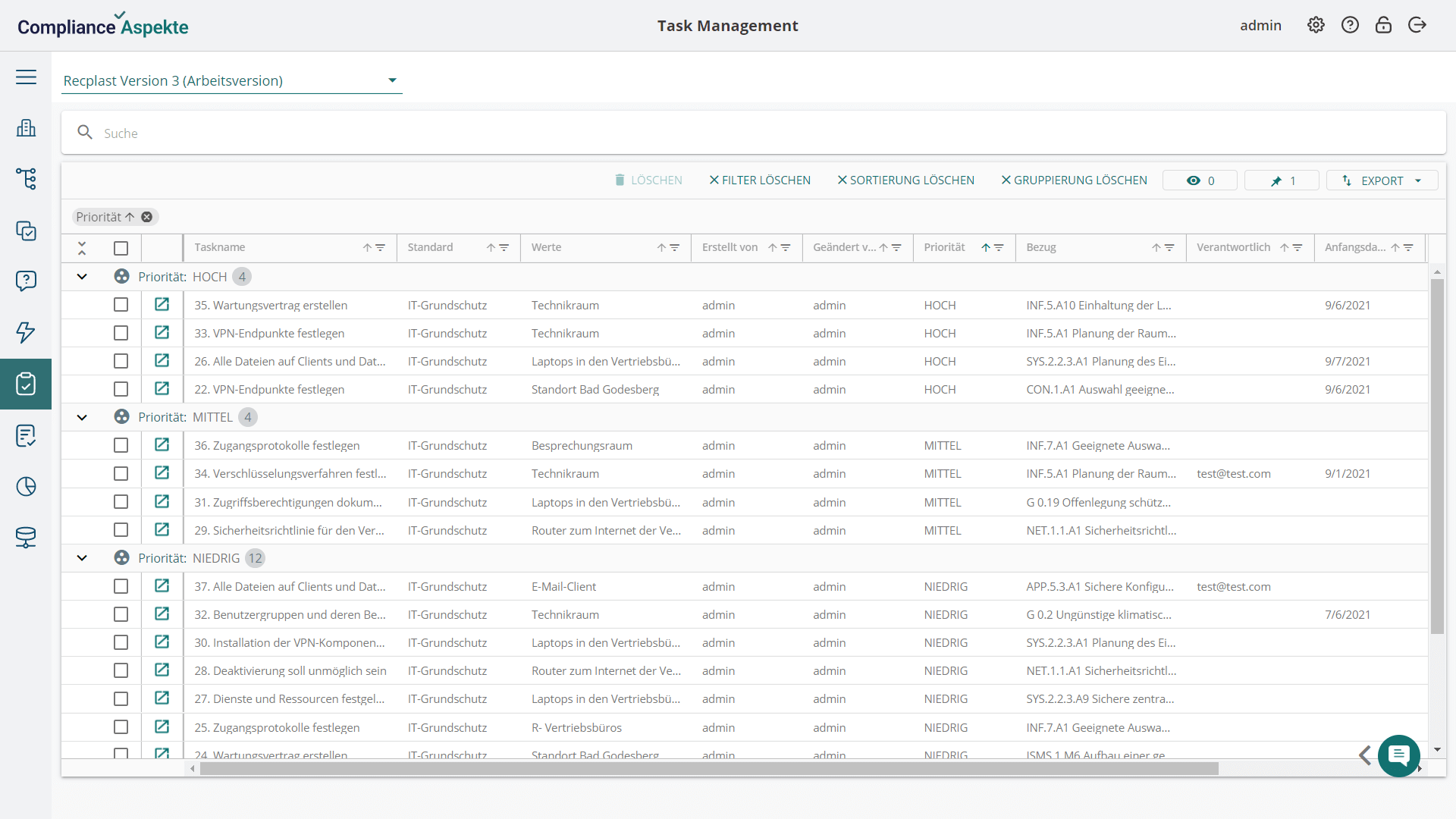
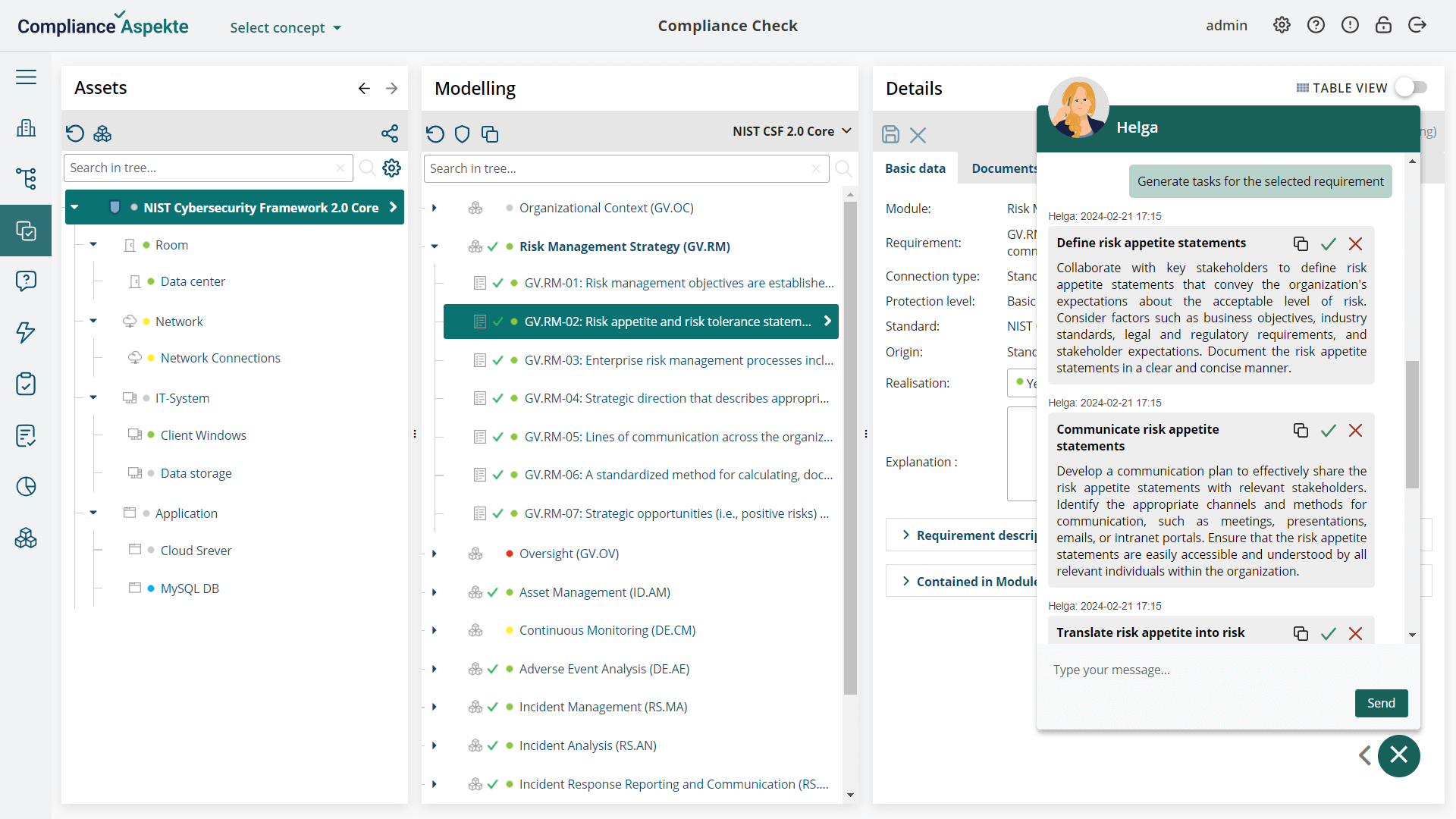
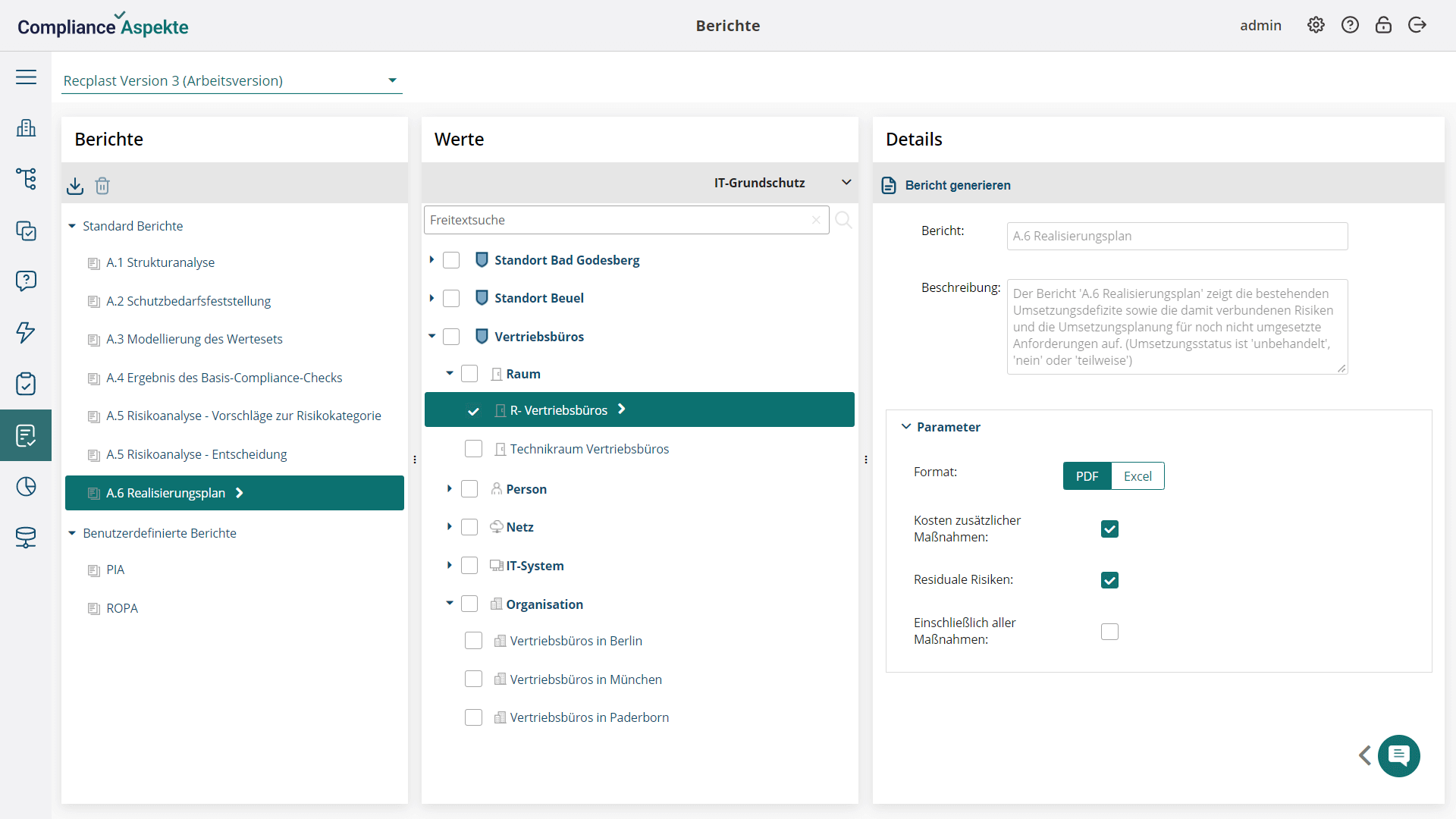
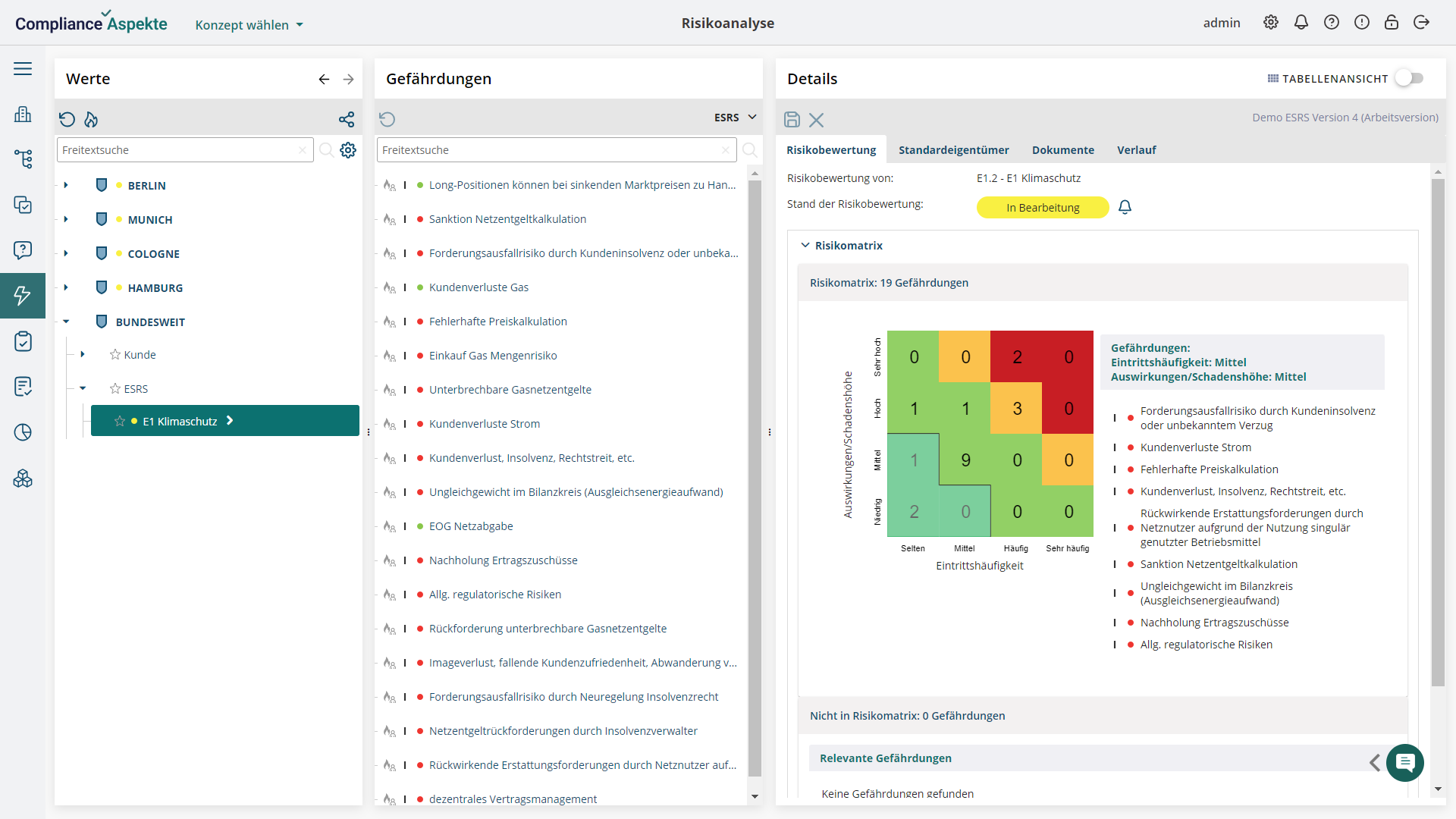
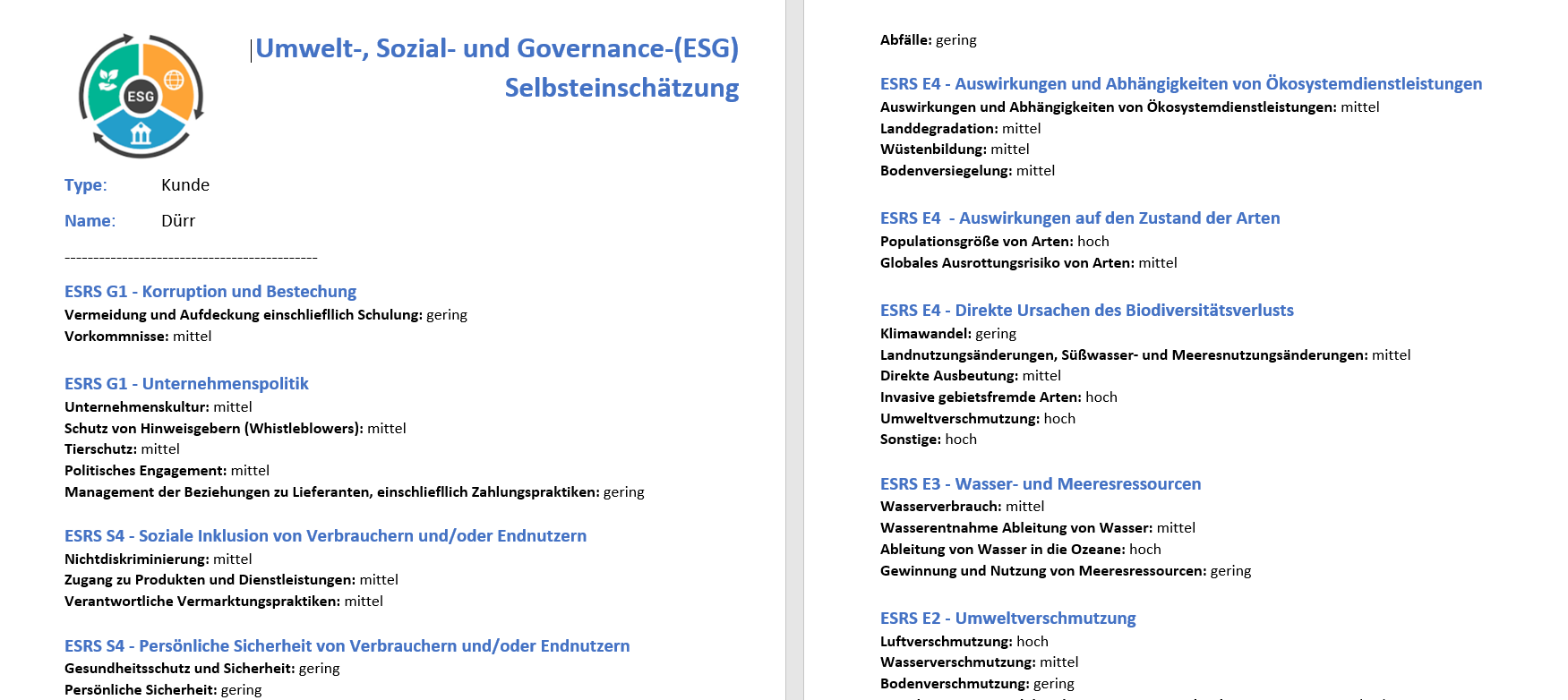
The Compliance Aspekte ESG tool visually displays the connections between various ESG metrics (e.g., energy consumption, water usage, employee satisfaction, board composition, etc.) and their relevance to specific stakeholders, clients, or projects.
Using the ESG software, users can send stakeholders a link to a ready-made Double Materiality Assessment form integrated into the system. The data stakeholders enter into this form will automatically appear in the system.
This allows your assessments and stakeholder evaluations to be averaged seamlessly into final results.
Compliance Aspekte has task management functionality, which allows users to create tasks for ESRS implementation and share them within the company and with external users.
The ESG software has a smart AI Copilot that can explain how the Compliance Aspekte system works, create and assign tasks, provide information about ESG, CSRD, ESRS, and more.
The AI assistant can also suggest what actions need to be taken to be compliant with ESRS and other standards.
Compliance Aspekte AI Copilot can search through uploaded documents for ESG-related information. For example, it can find whether certain requirements are in company policies, contracts with stakeholders or clients, or other documents.
Compliance Aspekte ESG software has an in-built risk management system with which you can determine ESG-related risks and make risk assessments for each individual ESG process.
Using our ESG software, you can easily generate ESG reports that сan be downloaded in PDF or printed for signing and sending.
Get started with our ESG reporting software
Contact usCompliance Aspekte is trusted by
Testimonials
We were new to compliance and ISO 27001 implementation and had to go through the sophisticated certification process. Puzzled by the regulatory complexity, we wanted to find the best way for us to get started. Our project manager (aka security officer) had never worked with such compliance aspects and rules before. So we decided to get third-party assistance and signed up with Compliance Aspekte. Their guided approach has played a vital role for us. They had all the detailed explanations for compliance checks and risk analyses, including suggestions on how to handle it practically.
One of the features we like best about Compliance Aspekte is its streamlined compliance process. At every stage during the security management lifecycle process, recurring tasks like scoping, structural analysis, modeling, and even tracking risks and controls are supported by a variety of features, e.g. mapping controls with multiple requirements, assigning individual assets to different scopes as well as expanding requirement and control catalogs. Having Helga, the compliance assistance bot, is also a very special plus as she can explain terms and provides guidance through the application. We really love and live Compliance Aspekte!
Compliance Aspekte is very user-friendly and customization is easy. We can conduct ISO compliance, and data protection…we can make anything we want in one tool. And this is the only tool with which it is possible. It helps us to keep the data consistent and simplify audits. The Compliance Aspekte tool is better than the existing competitors on the market and at the same time cheaper.
CSRD essentials: What you should know
What is the CSRD Directive?
The 𝐂𝐨𝐫𝐩𝐨𝐫𝐚𝐭𝐞 𝐒𝐮𝐬𝐭𝐚𝐢𝐧𝐚𝐛𝐢𝐥𝐢𝐭𝐲 𝐑𝐞𝐩𝐨𝐫𝐭𝐢𝐧𝐠 𝐃𝐢𝐫𝐞𝐜𝐭𝐢𝐯𝐞 (𝐂𝐒𝐑𝐃) is a significant legislative framework enacted by the European Union to enhance and standardize sustainability reporting across companies operating within its member states.
It expands on the previously established 𝐍𝐨𝐧-𝐅𝐢𝐧𝐚𝐧𝐜𝐢𝐚𝐥 𝐑𝐞𝐩𝐨𝐫𝐭𝐢𝐧𝐠 𝐃𝐢𝐫𝐞𝐜𝐭𝐢𝐯𝐞 (𝐍𝐅𝐑𝐃) and aims to provide more detailed, reliable, and comparable sustainability information to investors, stakeholders, and the public.
What is ESG and ESRS?
𝐄𝐒𝐆 (𝐄𝐧𝐯𝐢𝐫𝐨𝐧𝐦𝐞𝐧𝐭𝐚𝐥, 𝐒𝐨𝐜𝐢𝐚𝐥, 𝐚𝐧𝐝 𝐆𝐨𝐯𝐞𝐫𝐧𝐚𝐧𝐜𝐞) refers to the three central factors in measuring the sustainability and societal impact of an investment in a company or business.
𝐄𝐒𝐑𝐒 (𝐄𝐮𝐫𝐨𝐩𝐞𝐚𝐧 𝐒𝐮𝐬𝐭𝐚𝐢𝐧𝐚𝐛𝐢𝐥𝐢𝐭𝐲 𝐑𝐞𝐩𝐨𝐫𝐭𝐢𝐧𝐠 𝐒𝐭𝐚𝐧𝐝𝐚𝐫𝐝𝐬) are a set of standards developed as part of the EU’s CSRD. These standards are crucial because they ensure that all significant companies in the EU disclose relevant and comparable information on their environmental, social, governance, and human rights impacts. This information is valuable for investors, policymakers, and other stakeholders.
What timeline is set for the CSRD implementation?
𝟐𝟎𝟐𝟏 – initial development of the CSRD
𝟐𝟎𝟐𝟐 – adoption of CSRD
𝟐𝟎𝟐𝟑 – identification of ESRS technical standards and CSRD criteria
𝟐𝟎𝟐𝟒 – release of reporting guidelines for SMEs and non-EU companies
𝟐𝟎𝟐𝟔 – approval of industry-specific ESRS requirements
What are the data requirements?
𝐄𝐒𝐑𝐒 𝟏: Double materiality assessment, sustainability due diligence, supply and value chain, timeline
𝐄𝐒𝐑𝐒 𝟐: Governance: Governance Disclosure Requirements, Governance 1-5; strategy: SBM 1-3; impacts, risks and opportunities – IRO 1-2 (based on Double Materiality Assessment); metrics and targets
What companies are impacted by CSRD?
European and non-European companies previously covered under NFRD reporting criteria that have:
- 500+ employees
- 40+ million euros turnover
- 20+ million euros in the balance sheet
Large enterprises that have:
- 250 employees
- 40 million euros turnover
- 20 million euros in the balance sheet
European and non-European SMEs listed on a regulated European market (excluding microenterprises) that have:
- 10 employees
- 900k euros turnover
- 450k euros in the balance sheet
Large non-European companies whose European revenue exceeds 150 million euros through a subsidiary or branch located within the European Union.
Book a first free consultation and Compliance Aspekte demo
FAQ

To understand the meaning of ESG, we first need to decipher the abbreviation. ESG stands for Environmental, Social, and Governance, a framework used to evaluate a company’s sustainability and ethical impact.
The Environmental aspect examines a company’s impact on the natural environment, including energy use, waste management, and climate change.
The Social component looks at how a company manages relationships with employees, suppliers, customers, and communities, covering labor practices, health and safety, diversity, and human rights.
Governance focuses on a company’s internal practices, controls, and procedures, including board structure, executive compensation, ethics, and transparency.
ESG criteria help investors and stakeholders make informed decisions aligned with long-term sustainability and ethical considerations. Companies excelling in ESG are seen as more resilient and better prepared for future challenges.
ESG software & CSRD software are tools created for ESG risk management to help companies manage, track, and report on their environmental, social, and governance (ESG) performance and initiatives. This software enables organizations to collect relevant data, analyze ESG risks and opportunities, set targets and goals, and communicate their ESG efforts to stakeholders.
Sustainability reporting software can include features such as data collection and aggregation, performance monitoring, benchmarking, reporting, and stakeholder engagement tools. It helps companies integrate sustainability into their operations, improve transparency, and meet ESG reporting requirements.
ESG reporting involves disclosing environmental, social, and governance practices and impacts of a company. It is important because it provides transparency to investors, stakeholders, and the public on a company’s sustainability practices, helping to build trust and manage risks. It can also drive improvements in operational efficiencies, enhance brand reputation, and support compliance with regulatory requirements.
The Corporate Sustainability Reporting Directive (CSRD) is an EU legislative framework aimed at improving and standardizing sustainability reporting among companies. Expanding on the Non-Financial Reporting Directive (NFRD) it requires detailed and comparable disclosures on environmental, social, and governance (ESG) factors.
The CSRD applies to all large companies and listed SMEs, mandating them to report on sustainability issues, undergo assurance of sustainability information, and follow European Sustainability Reporting Standards (ESRS). This directive enhances transparency and reliability in sustainability reporting, supporting the EU’s goals for sustainable business practices and climate change mitigation.
The Corporate Sustainability Reporting Directive (CSRD) extends the EU’s non-financial reporting requirements to all large companies and all companies listed on regulated markets (except listed micro-enterprises). This includes companies that meet two out of the three following criteria: more than 250 employees, a net turnover of more than €40 million, or a total balance sheet over €20 million.
The CSRD will be phased in gradually:
- 2024: Companies already subject to non-financial reporting requirements will need to comply with CSRD for reports published in 2025.
- 2025: Large companies that were not previously subject to non-financial reporting will need to comply with CSRD for reports published in 2026.
- 2026: Listed SMEs, small and non-complex credit institutions, and captive insurance undertakings will need to comply with CSRD for reports published in 2027.
The ESRS are a set of standards developed to provide a framework for sustainability reporting across the EU, ensuring consistency and comparability of disclosures. These standards are part of the broader CSRD initiative and are designed to support companies in meeting the detailed reporting requirements set out by the CSRD, covering various ESG aspects comprehensively.
Double Materiality Assessment evaluates a company’s significant impacts from two perspectives:
- Financial Materiality: Assesses how environmental, social, and governance (ESG) factors affect the company’s financial performance and risks.
- Environmental and Social Materiality: Examines the company’s impact on the environment and society.
This dual approach helps companies identify key ESG issues, improve sustainability practices, and communicate effectively with investors and stakeholders.
Compliance Aspekte ESG reporting tool includes features that streamline the Double Materiality Assessment process, which evaluates the significance of external impacts on the organization and the impact of the organization on external factors. The tool provides functionalities for stakeholder input, data analysis, and visual reporting, helping companies identify and prioritize material issues that are both impactful to the business and relevant to their stakeholders.

Effective and easy-to-use IT security management system based on the latest standards and regulations — from planning and establishing the security concept to certification.
